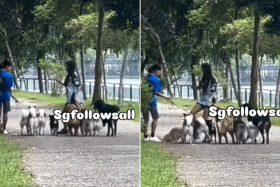'Chippy', the Kent Ridge Park monkey, to be rehabilitated after complaints
Monkey at Kent Ridge Park to be returned to wild
Chippy the monkey, said to be bothering residents living near Kent Ridge Park, has been removed to be rehabilitated and returned to the wild.
In a joint statement to The New Paper earlier this week, the Agri-Food & Veterinary Authority (AVA) and National Parks Board (NParks) said it was done "to ensure public safety".
Mr Louis Ng, head of the Animal Concerns Research & Education Society (Acres), also said: "Chippy is a wild macaque. We are working on rehabilitating Chippy so that she can hopefully be wild and free again rather than be held captive."
The two agencies said they had received feedback about monkey nuisance and attacks in the vicinity of Kent Ridge Park and Normanton Park condominium.
Their statement said: "We have ascertained that this nuisance was caused by a lone macaque which was regularly fed by some members of the public.
"...Monkey nuisance and attacks often arise when monkeys are fed by irresponsible members of the public.
"Feeding wild monkeys alters their natural behaviour and makes them reliant on humans for food. This eventually leads the monkeys to display aggressive behaviour such as grabbing plastic bags and food containers from people."
Under the law, monkey-feeding is an offence and the penalty is a fine up to $50,000 or a jail term up to six months, or both.
But Madam Prema, a 70-year-old Normanton Park resident who befriended the long-tailed macaque, told TNP in a phone interview that Chippy "had never grabbed anyone's bag or attacked park-goers".
Chippy made his appearance in February.

Madam Prema's daughter, Ms Maria Chaya, said: "I remember my mother coming home that first day and telling us how he sat next to her and was friendly.
"We called the SPCA (Society for the Prevention of Cruelty to Animals), who then advised us to call Acres. Its staff came down to observe him and told us he was a young transient, a lone monkey, and for us to leave him alone and we did."
Prior to Chippy, the last monkeys seen in the area were between 2009 and 2010, said Ms Chaya.
"The troop was subsequently culled because they entered Normanton Park and had bitten someone. In the preceding six years, no monkeys, troops or transient, have been seen in Lower Kent Ridge or Normanton Park," she added.
Madam Prema's friendship with the monkey came to light when a petition was posted online by British monkey sanctuary, Wales Ape and Monkey Sanctuary, not to have the primate culled but re-homed with it.
The family said they contacted the sanctuary in April, only when the abuse of Chippy had escalated. Ms Chaya said she was willing to pay to have Chippy vaccinated, quarantined and then shipped to Britain.
Madam Prema said she misses her primate friend and is feeling depressed "because I helped them entrap him".
"I called, he came and went into the cage," she said.
Should rehabilitation fail, would Chippy be sent to a sanctuary abroad?
An NParks spokesman said the objective behind NParks, AVA and Acres working together was to rehabilitate the macaque so as to wean it off human food and "reverse the monkey's dependence on humans".
"Acres had successfully rehabilitated macaques and reintroduced them back to the forest previously. The rehabilitation process usually takes a few months, though it differs from monkey to monkey," said the spokesman.
She also added that Chippy is a native wildlife.
"In general, the Government and Acres do not support the export of native wildlife overseas," she said.
Get The New Paper on your phone with the free TNP app. Download from the Apple App Store or Google Play Store now


